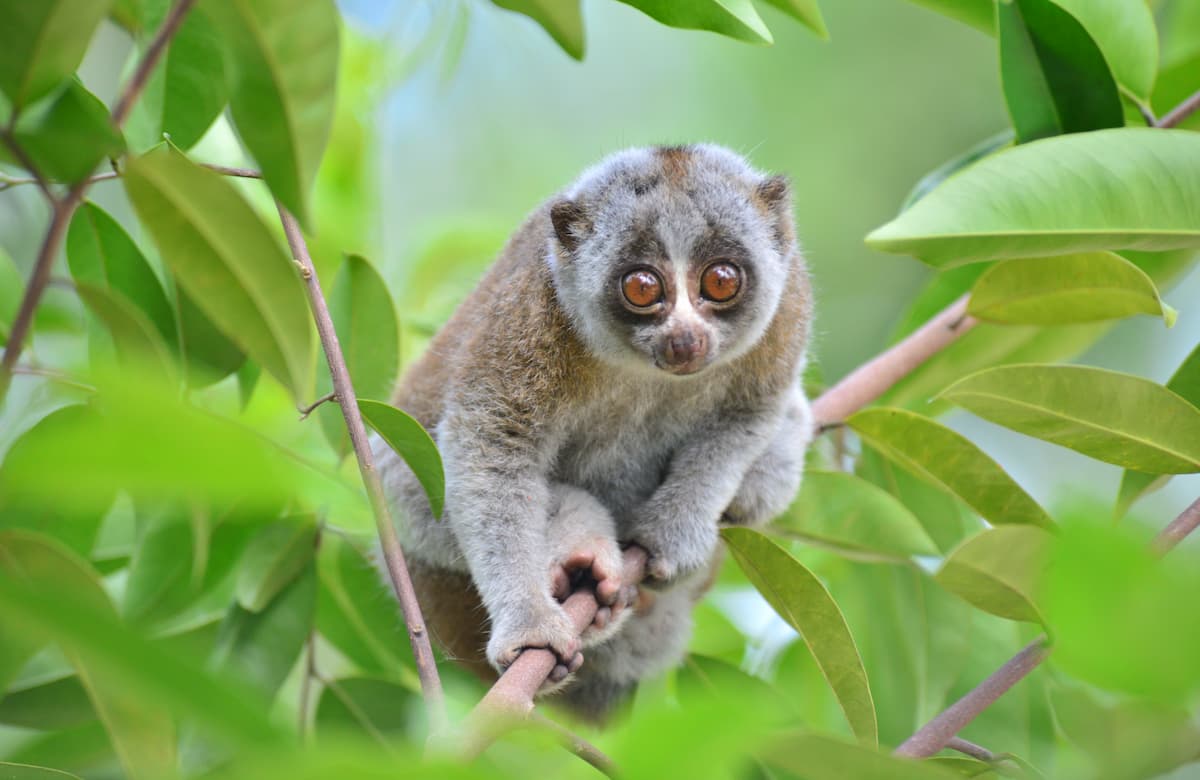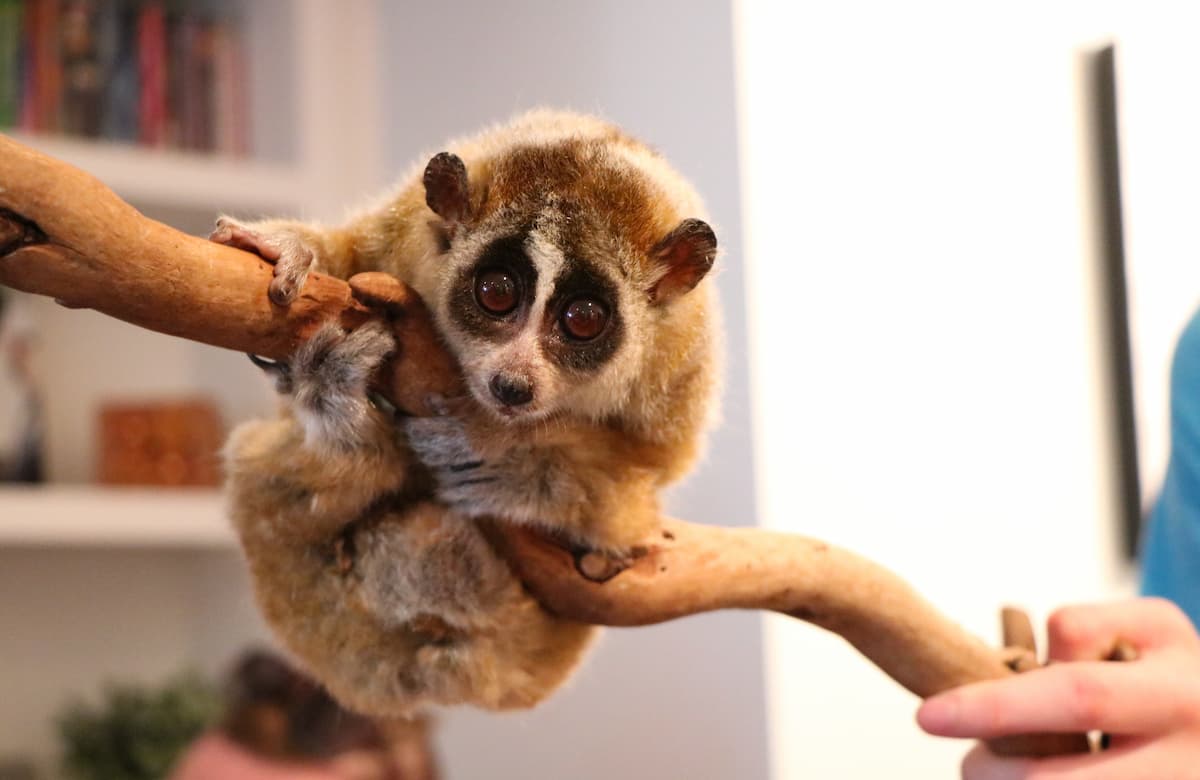
At Khaolak Merlin Resort, we believe that a sustainable future depends on what we do today. That’s why, as an eco-friendly hotel in Khaolak, we take an active role in animal conservation. Animal conservation goes beyond just preserving nature’s habitats; it’s also about preserving flora and fauna for future generations to enjoy.
We are fortunate to have 30 rai of land that’s home to a diverse variety of flora and fauna. Trees make up a significant part of our landscape, with some as old as a hundred years. Many of our native trees within our eco-friendly hotel in Khaolak form the perfect habitat for the local slow loris population.
Slow Loris: The Unusual Primate
At first glance, the slow loris appears to be a real-life teddy bear of sorts. Its big eyes and furry rotund body immediately sets off an urge to cuddle it, but doing so wouldn’t be wise. Despite their cuddly appearance, these nocturnal animals are actually venomous. Although the slow loris looks nothing like their primate cousins, they are closely related to monkeys.
The Slow Loris is not Slow
The slow loris is so named for its relaxed pace of life, which was observed by 18th-century explorers who first came upon the mammal. These early explorers described the slow loris as sluggish and sloth-like and naturally coined it the ‘slow loris’.
However, the name might be a misnomer as the slow loris can hustle when needed. When chasing a bug or avoiding predators, the slow loris isn’t slow at all. Though it is true that for most of the day, it prefers to stay still. Despite being venomous, it’s hard not to be taken in by this adorable creature.
The Slow Loris Habitat
This mammal usually lives up in the trees and is superbly adapted to thrive in this environment. Equipped with strong hands, flexible ankles and wrists, and extra vertebrae, they are extremely bendy, which allows them to transit from tree to tree stealthily. Unlike their other primate cousins, the slow loris is completely silent when on the move. The only time a slow loris would leave a tree would be to relieve itself.
The Slow Loris Diet
Being omnivores, the slow loris will happily devour a wide variety of birds, insects, reptiles, fruit, gum, and nectar. They have bottom front teeth that are modified to form a ‘toothcomb’, allowing them to use it for grooming and creating holes in tree barks from which they extract the sweet gum. A single slow loris can create more than a hundred holes in a night. Their narrow tongue is also designed to reach into these holes to lick the gum or nectar from flowers. You’re often able to observe a slow loris hanging upside down from their feet to eat with both hands.
Do Slow Loris Bite?
Yes, when a slow loris feels threatened, it immediately raises its arms and licks a bald patch just above its armpit, where its brachial gland excretes an oil. When its saliva is mixed with this oil, it creates a venomous solution in its mouth which is then soaked up by its toothcomb through capillary action.
When a slow loris bites, the venom immediately enters the bloodstream and causes severe swelling, pain, and a wound that can take a long time to heal. This venom can kill small mammals, and in humans, it can cause anaphylactic shock, heart palpitations, and even death.
Researchers have often wondered why such an adorable creature would need such a deadly defence mechanism. They use it more often when fighting each other than against predators. The pungent smell of the venom is thought to discourage predators from making a meal out of slow loris babies. Females will often lick their babies with this venomous blend before leaving them in the tree to go foraging for food.
How we Protect the Slow Loris

Slow lorises are an integral part of the ecosystem because they help with seed dispersal and pollination. Although the full impact of their loss cannot be ascertained, scientists believe they are a crucial part of a balanced ecosystem.
The slow loris population is under threat, primarily for two reasons: deforestation and the wildlife pet trade. The increasing demand for land and lumber has seen the slow loris habitat shrink more and more each year. However, the primary reason for the declining slow loris population is mostly due to their illegal pet trade. Their adorable appearance has made them popular in the exotic pet industry, where demand in the illegal trade is far surpassing what the slow loris population is capable of replacing.
Protection and preservation of the slow loris is key to maintaining their wild population. Khaolak Merlin Resort works closely with the Love Wildlife Foundation of Thailand to monitor these adorable mammals through tagging and observation. Our eco-friendly hotel in Khaolak is proud to be able to provide a safe environment for these mammals to continue to thrive.
Khaolak Merlin Resort
We are a unique eco-resort nestled in the jungles of Khaolak, Thailand. Come and experience the wonder of nature by immersing yourself in its enchanting rainforest. Wake up to the sounds of the jungle and drift off into slumber with the echoes of a living rainforest. Book a stay with us today and experience nature like you have never before.